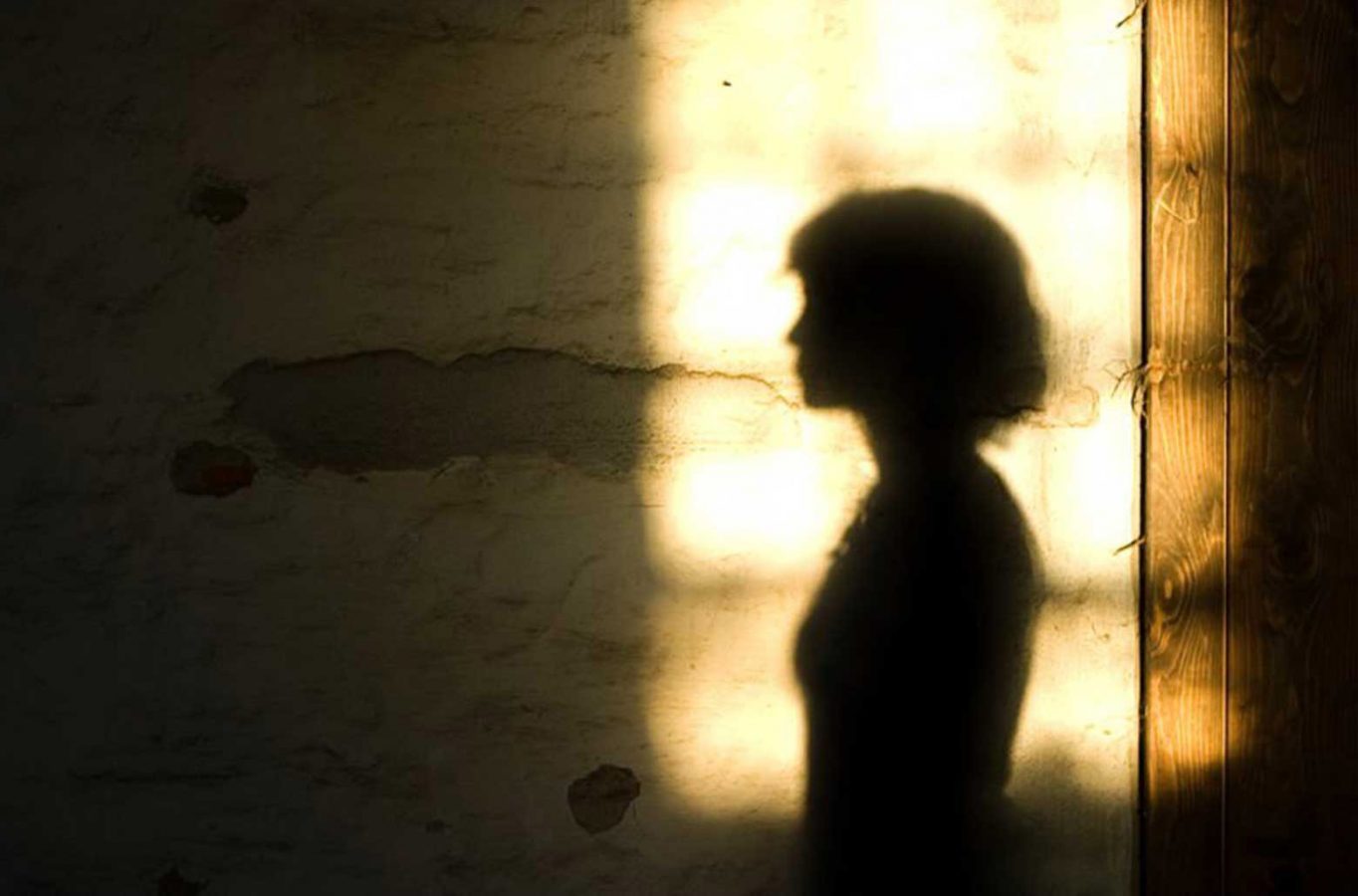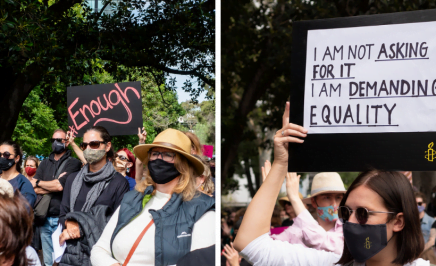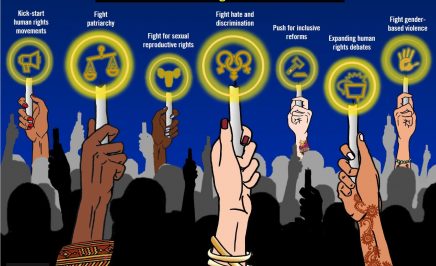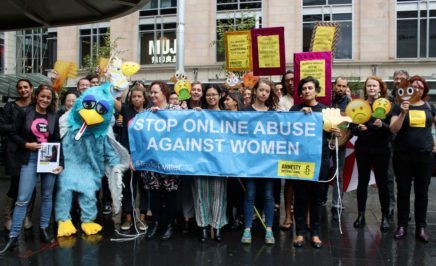This article was originally published on news.com.au on 8 September 8, 2021. Danielle Veldre is the Media Lead at Amnesty International Australia. When she moved to London at 21 years old and fell in love, she didn’t realise it would be the start of a nightmare.
I am a survivor of domestic violence and coercive control.
It took me about 20 years to be able to articulate that. Not because I was ashamed (ask my children, I don’t do embarrassment), but because I never identified what happened to me as domestic violence.
The thing about coercive control is that it creeps up on you. It crept up on me 25 years ago and it continues to do so – long after the relationship ended and now that I am into middle age and happily married to a good man.
It snuck up on me when I went to London as a hopeful 21-year old, full of the youthful promise of a shared house; a newly minted university graduate with a dream of getting my foot on the journalism ladder.
So when I went to one of the clubs I had read about in my beloved British music press and a bloke asked me to dance, it was the icing on the cake.
Soon he was calling me every day, taking me out on warm summer days and along with my new job, it was as though all the pieces were falling into place of my dream to give London a red hot go.
Hindsight of course reveals a very clear view – I was ripe for the picking. Low sense of self-worth, out of my element, away from my support networks.
And so, I found myself moving in with him. Little did I know that this meant any autonomy I might have had would vanish.
The phone calls would come at the same time at lunch every day just to say hi, but also to check I wasn’t away from my desk where I might, perish the thought, speak to a man.
Then on Saturday nights, I was allowed only to sit at home while he would go out literally all night, then I would have to take care of him and his hangover the next day.
He daily undermined my confidence with snipes over perceived behaviours like being a spoiled brat (presumably because I had a family who loved me, still haven’t worked that one out) to how I had “crocodile skin” – rendering me unattractive to anyone else, I can only surmise.
A trip to Italy to visit my grandparents and attend a wedding somehow became my expense to pay, despite the fact I earned less and I proposed we’d each pay our own way.
And on it went. When I decided to come back to Australia, I’d hoped this would be the best way to break it off. I lacked the maturity and skill to navigate this terrain. And frankly, I was scared. But he decided he would pack up his whole life and come with me – I didn’t ask him to, but this also became my responsibility and, ultimately, my fault.
When he struggled in Australia with the inevitable differences in lifestyle and work, I was responsible for uprooting him and “forcing” him to abandon his life in the UK.
I walked on eggshells every day fearing I would anger him if I took a step wrong.
Looking back on it, I was living in constant fear. I lost a lot of weight. I stopped being able to concentrate enough to read a book, I stopped using “big words” which apparently were a threat in some way. I stopped being creative and dreaming of what I could achieve. In short, I stopped being me.
When the pressure got too much he hit me. Just twice. But honestly, the daily psychological effort of dealing with the mental games was harder to bear.
Finally I found the emotional resources to leave – aided by my uncle’s partner and a good friend who helped me pack all my stuff up and flee. I had the good fortune to access legal help, the Police I dealt with were respectful and helpful and I was able to obtain an apprehended violence order. I am keenly aware that not everyone has positive and effective experiences with the law, especially if they’re a person of colour. And not everyone gets out alive.
But even with this assistance, my experience didn’t begin to end there. There has followed 20 years of stalking and fear. It’s faded over time, but the emails still come sporadically demanding I explain myself and why I broke it off, at turns conciliatory, cajoling, abusive. You never know what you might get.
But what I find most confounding and perplexing about the whole experience is my inability to, until recently, identify as someone who had experienced domestic abuse.
When I realised later, much later, what I was experiencing was symptomatic of PTSD (nightmares that I still have, anxiety and depression), I posted about it on my private social media (it all has to be private due to the stalking) and identified for the first time as a survivor. My friends’ reactions were very supportive and kind, but some also expressed surprise that someone as “strong” as me could have been in that position. But that’s the thing – there’s no one kind of person who finds themselves in these positions, because they aren’t immediately apparent, and when they are you’re so broken in confidence and gaslit you can’t see your way out.
My experience illustrates exactly why we need a radical reshaping of the way authorities understand and respond to gender-based violence so perpetrators can be accountable. A unified national definition would be a positive step in better identifying risks and patterns of behaviour.
The fact the government voted against 49 of the 55 recommendations in the Workplace Sexual Harassment review ahead of the National Women’s Safety Summit doesn’t fill me with hope that our leaders are as committed to the kind of reform we need to really create the change that will keep women safe.
There must also be funding for and commitment to training the police, judiciary, court workers, first responders, etc on coercive control as well as funding for support services for people experiencing coercive control.
But before we begin to consider legislating for this behaviour there has to be widespread and genuine consultation with affected communities to understand and prevent the potential unintended consequences of criminalising coercive behaviour. Any reform has to work for all people affected by gendered-violence, not just those in positions of privilege.
Learn more about Amnesty International Australia’s women’s rights work here.





